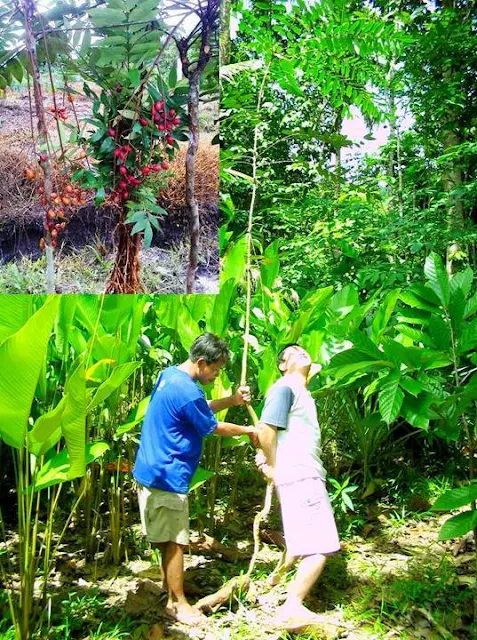Pasak Bumi (Eurycoma Longifolia) : A Unique Attraction for Ecotourism in Kalimantan
 |
| The myth is that pulling out the pasak bumi should be done facing the back of the tree for easy extraction |
Pasak bumi (earth spike) also known as tongkat ali or Eurycoma longifolia, is one of the exotic treasures of the Kalimantan forest. This plant serves as a primary attraction for ecotourism on the third-largest island in the world.
With its characteristic of being unbranched and exclusive growth in specific locations, the pasak bumi captivates the attention of foreign tourists interested in Indonesia's biodiversity and cultural heritage.
Kalimantan: a home to the pasak bumi
When visiting Kalimantan for ecotourism, travelers can explore the forests that are home to the pasak bumi, experiencing the uniqueness of this plant believed to have benefits in enhancing male potency.
The exotic nature and diversity of traditional medicinal plants, including the earth spike, add to the appeal for those who appreciate natural richness and local wisdom.
As an island with a highly diverse ecosystem, Kalimantan also offers ecotourism experiences involving unique flora and fauna.
However, in developing ecotourism, it is crucial to balance environmental preservation with sustainable utilization of medicinal plants.
This is essential to ensure environmental sustainability and the protection of rare plants like the earth spike for the enjoyment of future generations.
Believed to enhance male potency, the earth spike has become a widely traded commodity. It is challenging to find and requires courage.
When found, extracting the earth spike must be done facing the back of the tree. Strangely, to obtain the earth spike, adherence to specific taboos is necessary.
Pasak bumi increases energy
Is it true that the pasak bumi increases energy, particularly enhancing male potency? Is it a myth, or an undeniable reality?
The earth spike is becoming increasingly difficult to find. From the provincial capital of West Kalimantan, Pontianak, this rare plant can only be found nearly 450 km away. Deep into the interior, near the border with Sarawak, Malaysia.
Two taboos surround the earth spike.
First, before and during the search for the earth spike, one must refrain from using dirty and vulgar language.
Second, when found, pulling the earth spike must be done facing the back of the tree, not directly.
 |
| Morphology of pasak bumi: leaf, fruit, stem, and root. |
This rare plant actually grows amidst other trees. Its Latin name is eurycoma longifolia, known as tongkat ali in Malaysia and also referred to as bidara pahit in Indonesia.
The plant grows individually and is rarely found in clusters. If not careful, it is challenging to recognize. Not everyone dares to find it; it's a matter of luck.
The trunk of the earth spike tree is actually small, with useful portions starting from the size of a thumb. Some can be as large as a calf, but the most substantial ones are about the size of an adult thigh.
Even though it's as big as a thumb, do not think it's easy to extract the earth spike plant. It's quite difficult! Its roots go deep into the ground. Without knowing how to extract it properly, one can fail to obtain the plant.
Walking about an hour from Jangkang, we reached a hill. Not entirely pristine, but the forest is still thriving.
There's a 12-meter-high waterfall flowing freely. In the valley of the hill, the air is cool and fresh. Fine rocks line the "Itu" river.
Besides boosting energy, the benefits of the earth spike are believed to help cure many diseases, such as malaria and stomach flu.
In urgent situations without hot water available, patients can simply bite the earth spike root. If the taste in the mouth turns bitter, it can be consumed as medicine.
After being pulled, the earth spike tree root is washed, dried, and then sun-dried. Once dry, it's ready for consumption. It can be finely sliced, steeped in warm water without soap, poured into a glass, and then consumed.
If one doesn't want the hassle of preparing it from the root, the earth spike is also available in the form of a glass or cup. The size is similar to a regular glass. These earth spike glasses are widely sold in markets and are also available in traditional Dayak craft centers along Pattimura Street, Pontianak.
The earth spike glass just needs warm water poured into it. After a few minutes, it will turn yellow. Once it resembles tea, it's ready to be consumed. No need to add sugar. It has a natural taste.
The benefits of the pasak bumi
The benefits of the pasak bumi become noticeable a few hours later. Whether it's due to suggestions or its actual benefits, the body feels fresh and light after consuming this traditional tea.
Myth or not, what is clear is that the earth spike, a plant unique to Kalimantan, has become a commodity. It is even exported abroad. Don't focus on its high price (a glass of earth spike tea in Pontianak costs Rp30,000.00).
However, look at its benefits. A glass of earth spike tea has been proven to increase enthusiasm and potency.
For traditional communities in Kalimantan, the earth spike also serves as a medicinal plant that can cure malaria and stomach flu.
(Masri Sareb Putra)






